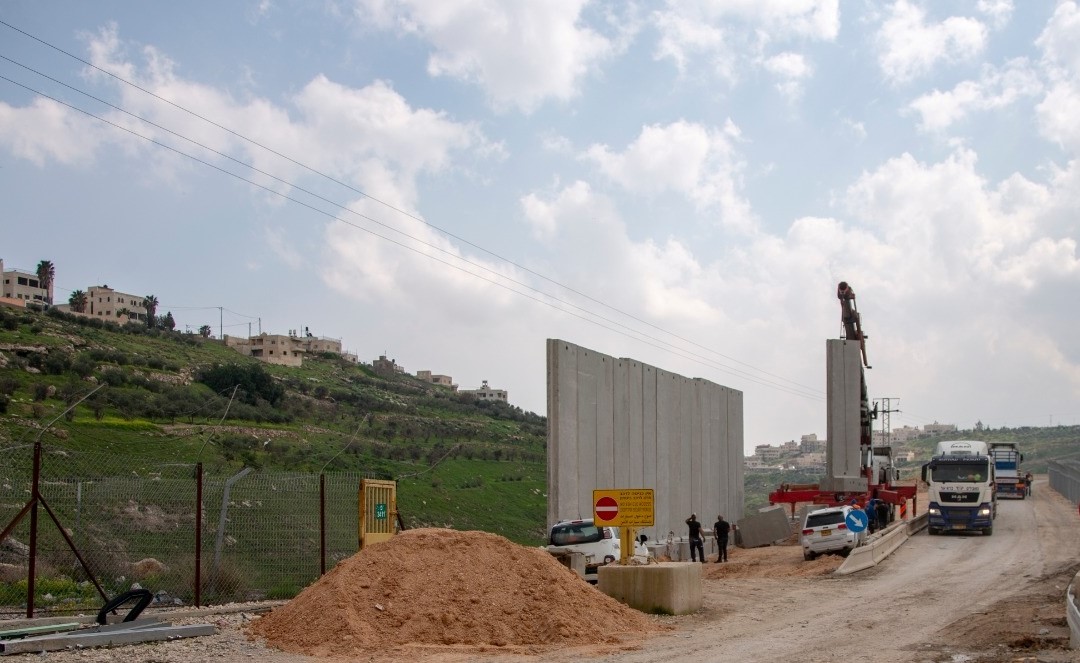In the two weeks between March 3 and 16, as the Palestinians were battling to stop the spread of the deadly coronavirus disease in their vulnerable territory, Israel military forces killed one young Palestinian, injured 200 others, detained over than 100 people, demolished 16 homes and structures displacing 35 people, and bulldozed a vital road connecting remote Palestinian villages, according to a United Nations report.

On March 16, Israeli authorities started the construction of a new wall next to the Palestinian town of Sur Bahir in occupied eastern Jerusalem. The wall is expected to surround a new road that will connect Ma’ale Adumim settlement with a number of small settlements east of Jerusalem. (Photo: Activestills)
In its biweekly “Protection of Civilians” report, the United Nations Office for the Coordination of Humanitarian Affairs (OCHA) in the occupied Palestinian territories said that on March 11, Israeli forces shot and killed a 16-year-old boy in Beita town, in the north of the West Bank, and injured 132 Palestinians, including 17 children, as Palestinians attempted to prevent Israeli settlers from taking over a vital peak in their town.
Israeli forces in multiple clashes injured another 67 Palestinians, including 20 children, across the West Bank during these two weeks. Israeli forces also carried out 78 search and arrest operations across the West Bank, and arrested 110 Palestinians, including 16 children, said OCHA.
On March 5, Israeli forces punitively demolished two homes in Ramallah and nearby Birzeit for families of alleged Palestinian attackers, displacing six people, including a child. An additional 14 Palestinian-owned structures were demolished or seized on grounds of lack of building permits, displacing 29 people and affecting around 60 others. Ten of these structures were located in Area C of the occupied West Bank, which is under full Israeli military rule, five of which had been provided as humanitarian aid, including two residential tents and a solar panel system.
Israeli forces also bulldozed a section of a dirt road connecting five herding communities in Masafer Yatta, south of the southern West Bank city of Hebron, to their main service center. The communities are home to some 700 people.
In addition, three Palestinian civilians were injured, and at least 385 trees and Israeli settlers vandalized 15 vehicles in the West Bank during the reported weeks, said OCHA. These incidents bring to nearly 1,600 the number of trees reportedly vandalized by settlers since the start of 2020.
West Bank Shutdown
In the West Bank, Mohammad Shtayyeh, the Palestinian prime minister ordered people to stay at home for two weeks beginning from Sunday night, March 22, in an effort to slow the spread of the virus which had by then infected a known 57 residents of the territory. Exemptions are allowed for medical personnel, pharmacists, grocers and bakers and regular civilians are still allowed out to shop for food and medicines.
Meanwhile, the Israeli Military is blocking the entry to Palestinians from the West Bank, severely impacting its already tenuous economy and making an imminent collapse of the financially strapped Palestinian Authority a real threat. So much so that Israel, which views such a political disintegration as a critical threat to its own battle against the pandemic, authorized on Sunday, March 22, the transfer of 180 million shekels in back taxes to the Palestinian Authority. However the occupying power remains steadfast in its refusal to pass on more than 500 million shekels still owed the PA because of the latter’s paying of monthly stipends to the bereaved families of Palestinians whom Israel considers terrorists.
First Cases of Pandemic Reach Gaza
The first two cases of Covid-19 in Gaza were confirmed last weekend, raising fears about how the besieged territory’s overstretched health system will cope if the virus spreads through its population of 2 million.
The two Gaza cases are men aged 79 and 63 who returned to Gaza from Pakistan via Egypt during last weekend. They were placed in quarantine in the town of Rafah on Gaza’s border with Egypt. Officials said that all those who had been in contact with the pair had also been quarantined.
Gaza’s isolation, which includes severe restrictions on the cross-border movement of people, may have delayed the virus’s arrival. It could, however, spread rapidly given the concentration of people in overcrowded cities and refugee camps.
With the looming threat of an outbreak, many say the virus might be the last straw for Gaza’s weary residents.
Amira al-Dremly knew that it would only be a matter of time until the virus made its way to Gaza. But hearing the news that two had tested positive on Saturday still felt like “the end of the world,” the mother of four told Al-Jazeera, echoing the UN’s oft-repeated prediction that Gaza may be uninhabitable by 2020, although no one at the time envisioned the apocalyptic scenario being triggered by a global pandemic – the situation in Gaza was and is dire enough without coronavirus.
“The biggest fear is that the available resources in Gaza are not enough to act as a temporary solution [to the spread of the virus],” the 34-year-old said. “I’m very afraid for my children. I am taking measures to educate them about sterilization and have prevented them from leaving the house… But the psychological effects are difficult, my family and everyone around me are very confused by this news,” she added.
Gaza, one of the most densely populated areas in the world, is home to some of the biggest Palestinian refugee camps, and al-Dremly noted that social distancing is something that is “easier said than done”.
Related: Coronavirus Offers No Respite from Israeli Army Violence in West Bank


